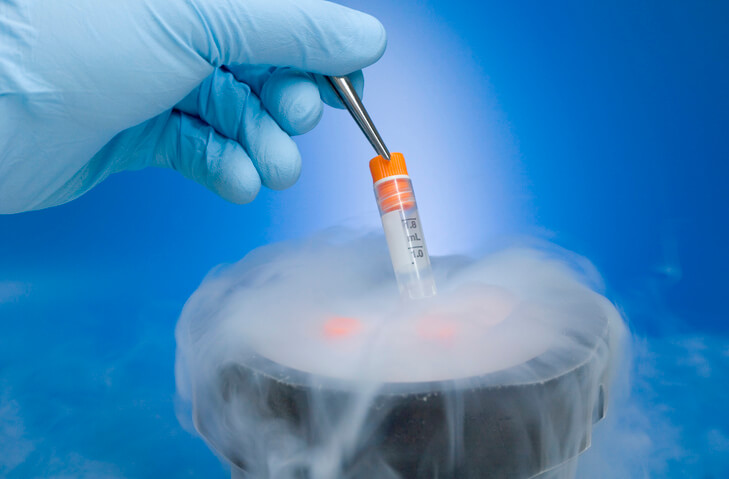It’s becoming more and more common for intended parents to use donated embryos as part of their gestational surrogacy. For many people, it makes sense: Embryo adoption is usually much cheaper than a fresh IVF cycle, and gestational surrogacy gives a degree of control over pregnancy that private domestic infant adoption cannot.
However, embryo adoption — increasingly called “snowflake adoption” — is not for everyone. In fact, if you’re a single or LGBT intended parent, embryo adoption could likely be much harder for you than it would be for a married, heterosexual couple.
Why? Keep reading below to learn more.
The Religious Overtones of Embryo Adoption
As more hopeful parents go through the in vitro fertilization process to become pregnant, there’s been an unanticipated result: a growing number of frozen embryos being stored indefinitely. For many intended parents, the idea of discarding embryos that they worked so hard to create is emotionally difficult. And, for a group of certain intended parents, discarding embryos would be akin to “killing” frozen children.
For many reasons, leftover embryos have been donated to organizations promising to give these “snowflake babies” a chance at life with someone else desperate to become a parent. In turn, the process is frequently called “embryo adoption” — invoking the same emotions as the adoption of a child already born.
As a New York Times piece reveals, embryo “snowflake” adoption is increasingly tied to organizations affiliated with anti-abortion rights or Christian organizations — many of which receive federal funding. Whether intentional or not, many of these organizations have closely affiliated themselves with the mindset of “pro-life” advocates. In their views, donated embryos are not just cells that can become a child; they already are a child.
An intended parent need only look at advertising materials from some of the biggest embryo adoption centers to see the evidence:
- From the National Embryo Donation Center: When couples decide that their family is complete but still have embryos remaining… they can thaw them out and let them die… Embryo adoption allows the genetic parents to give their embryos a chance for life.
- From Nightlight Christian Adoptions: Just as each snowflake is frozen, unique and a gift from heaven, so are each of our embryo adopted Snowflake Babies. We hope to help each donated embryo grow, develop and live a full life.
For these professionals, an embryo is more than just a collection of cells; they are children waiting to be born. This viewpoint overlooks the fact that, for many intended parents, a created embryo may or may not grow into a fetus for many reasons — quality of embryo, likelihood of implantation and more.
What This Means for LGBT and Single Parents
Putting aside the never-ending controversy of that position, what does this ethical viewpoint mean for intended parents wishing to use a donated embryo in their gestational surrogacy?
Here’s the quandary: Organizations that have this view of life at conception often have specific ideas of who should be a parent — specifically, that only heterosexual couples should pursue embryo adoption.
Both the National Embryo Donation Center and Nightlight Christian Adoptions have specific requirements for hopeful adoptive parents. In the case of NEDC, only a couple of a “genetic” male and female who are married can adopt, and embryos cannot be adopted to be used in a gestational surrogacy. Similarly, Nightlight’s initial application requires a mother and father to fill out their information, and the agency’s overarching requirements necessitate that an adoptive couple have a “spiritual home environment,” among other things.
Clearly, those who don’t fit the heteronormative expectations of these adoption agencies don’t have this option with those agencies — no matter how well-prepared they are to become parents.
If you’re a single intended parent or a member of an LGBT couple, embryo adoption may not be possible for your gestational surrogacy. That’s why it’s so important to seek out LGBT-friendly adoption agencies and donor centers. Unfortunately, there is still a great deal of prejudice out there for nontraditional families, and the steps it takes to bring your new addition home may be a bit more complicated than for a heterosexual married couple.
For a more comprehensive look at requirements of embryo adoption agencies, check out the Embryo Adoption Awareness Center’s list. It’s always a good idea to speak with a professional in person to determine whether you are eligible for their embryo adoption program.
Even if embryo adoption is not a possibility for your family, there are many other paths you can take to achieve your gestational surrogacy. To learn more about them, give our surrogacy specialists a call at 1-800-875-2229(BABY). Our agency happily works with all intended parents — regardless of marital status or sexual orientation — and we’d be honored to help you bring a child into your life.
